Exploring Student Nutrition and Food Choices Among First Year Students
VerifiedAdded on 2023/06/13
|9
|2579
|193
AI Summary
This report explores the nutritional components essential for students' bodies, the reasoning behind food choices and frequency among first year students, and interventions to overcome eating disorders and promote healthy living.
Contribute Materials
Your contribution can guide someone’s learning journey. Share your
documents today.
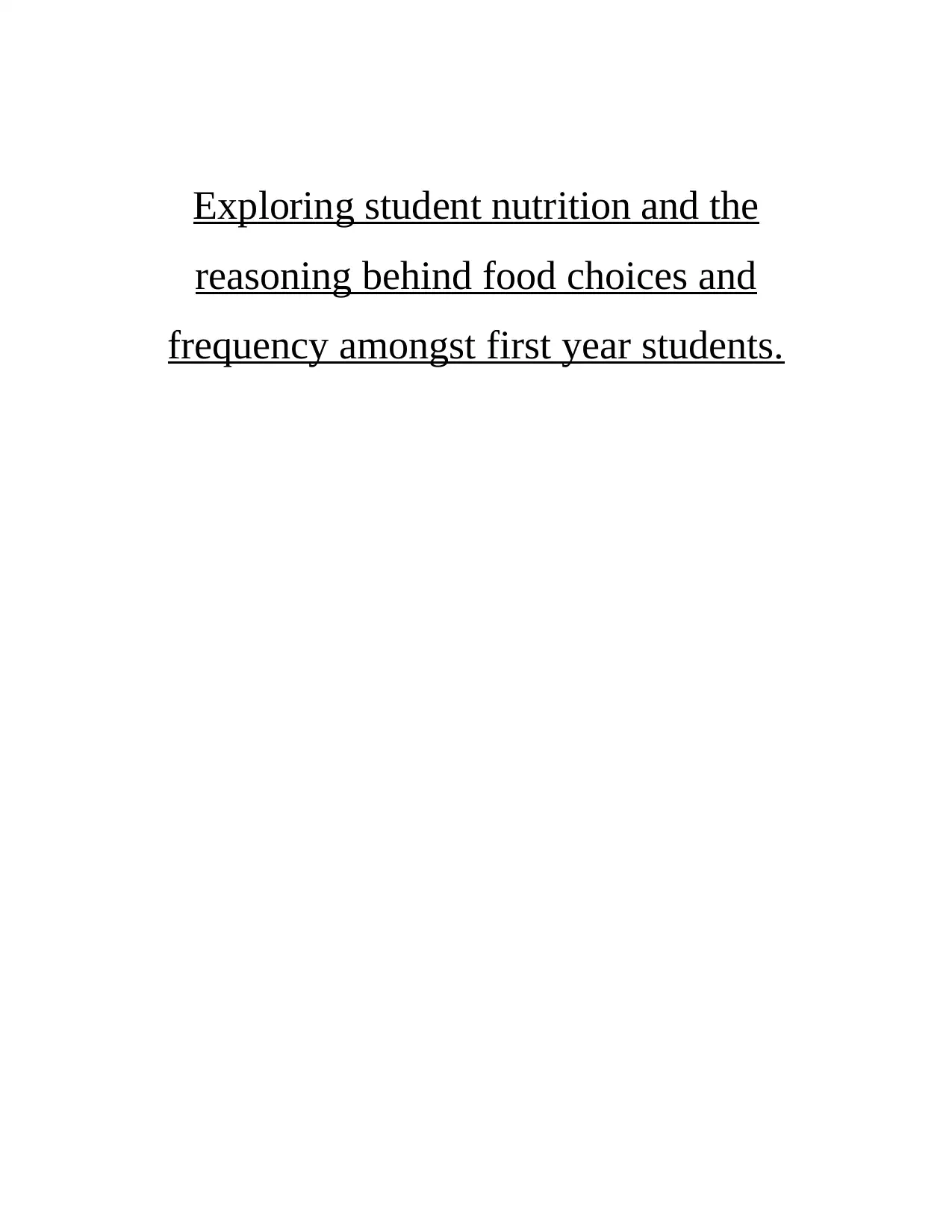
Exploring student nutrition and the
reasoning behind food choices and
frequency amongst first year students.
reasoning behind food choices and
frequency amongst first year students.
Secure Best Marks with AI Grader
Need help grading? Try our AI Grader for instant feedback on your assignments.
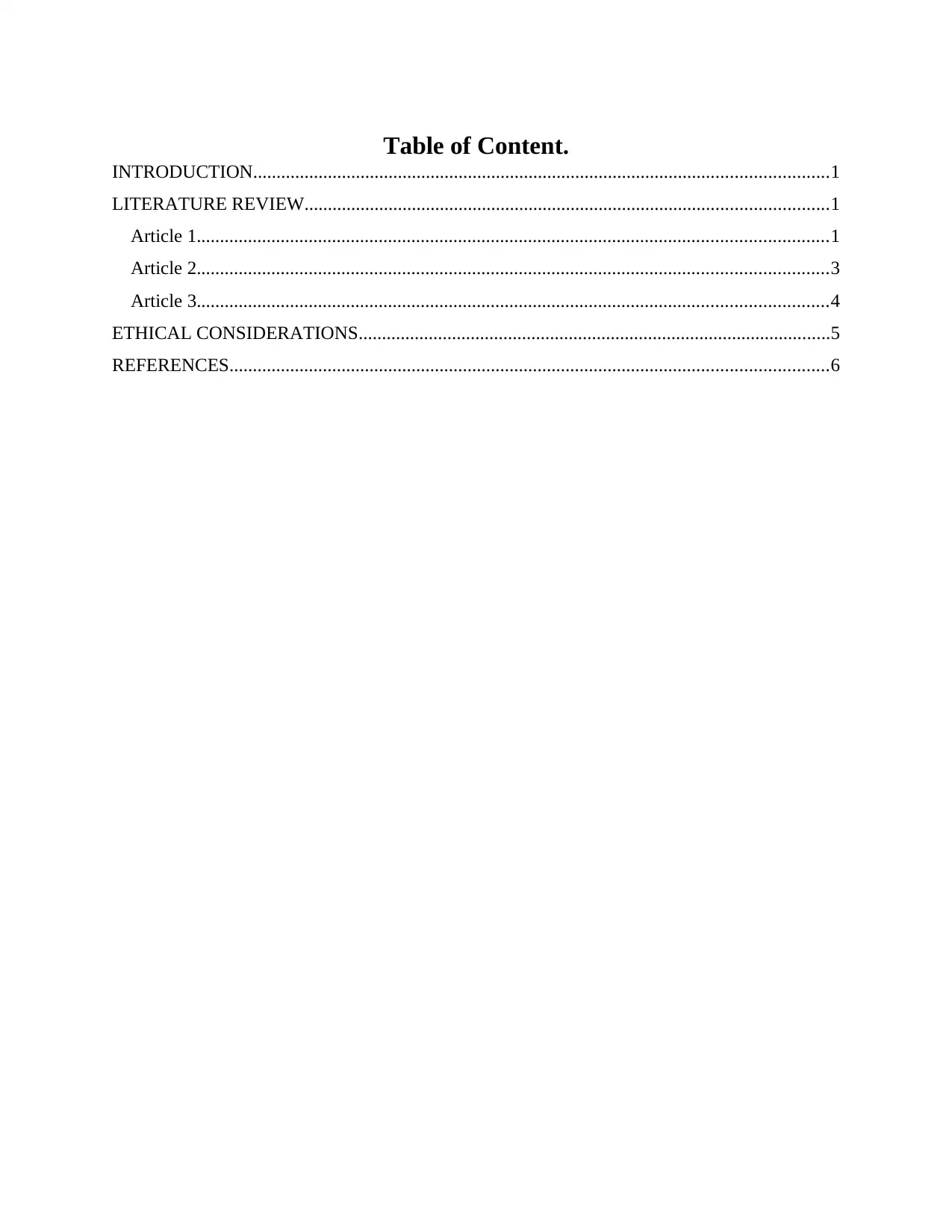
Table of Content.
INTRODUCTION...........................................................................................................................1
LITERATURE REVIEW................................................................................................................1
Article 1.......................................................................................................................................1
Article 2.......................................................................................................................................3
Article 3.......................................................................................................................................4
ETHICAL CONSIDERATIONS.....................................................................................................5
REFERENCES................................................................................................................................6
INTRODUCTION...........................................................................................................................1
LITERATURE REVIEW................................................................................................................1
Article 1.......................................................................................................................................1
Article 2.......................................................................................................................................3
Article 3.......................................................................................................................................4
ETHICAL CONSIDERATIONS.....................................................................................................5
REFERENCES................................................................................................................................6
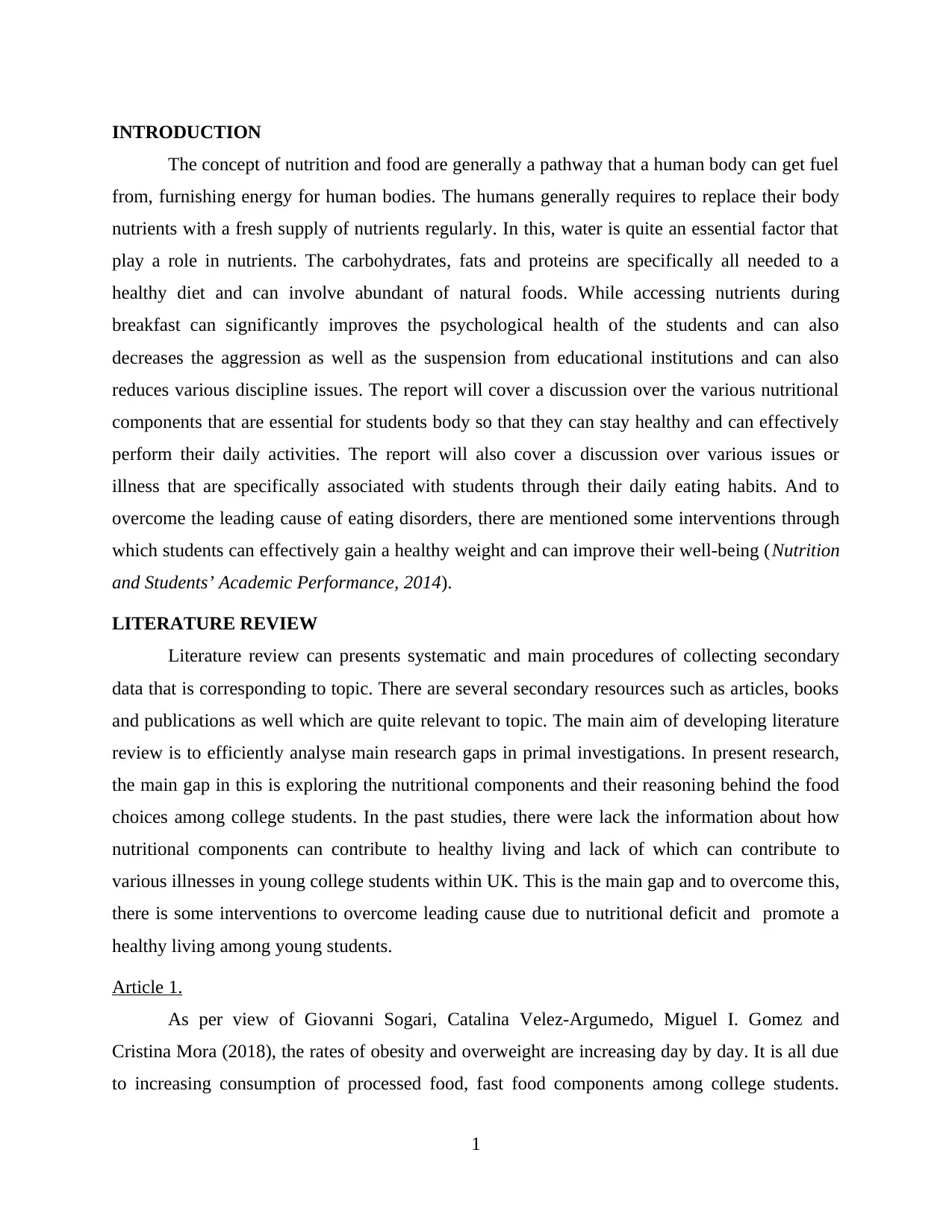
INTRODUCTION
The concept of nutrition and food are generally a pathway that a human body can get fuel
from, furnishing energy for human bodies. The humans generally requires to replace their body
nutrients with a fresh supply of nutrients regularly. In this, water is quite an essential factor that
play a role in nutrients. The carbohydrates, fats and proteins are specifically all needed to a
healthy diet and can involve abundant of natural foods. While accessing nutrients during
breakfast can significantly improves the psychological health of the students and can also
decreases the aggression as well as the suspension from educational institutions and can also
reduces various discipline issues. The report will cover a discussion over the various nutritional
components that are essential for students body so that they can stay healthy and can effectively
perform their daily activities. The report will also cover a discussion over various issues or
illness that are specifically associated with students through their daily eating habits. And to
overcome the leading cause of eating disorders, there are mentioned some interventions through
which students can effectively gain a healthy weight and can improve their well-being (Nutrition
and Students’ Academic Performance, 2014).
LITERATURE REVIEW
Literature review can presents systematic and main procedures of collecting secondary
data that is corresponding to topic. There are several secondary resources such as articles, books
and publications as well which are quite relevant to topic. The main aim of developing literature
review is to efficiently analyse main research gaps in primal investigations. In present research,
the main gap in this is exploring the nutritional components and their reasoning behind the food
choices among college students. In the past studies, there were lack the information about how
nutritional components can contribute to healthy living and lack of which can contribute to
various illnesses in young college students within UK. This is the main gap and to overcome this,
there is some interventions to overcome leading cause due to nutritional deficit and promote a
healthy living among young students.
Article 1.
As per view of Giovanni Sogari, Catalina Velez-Argumedo, Miguel I. Gomez and
Cristina Mora (2018), the rates of obesity and overweight are increasing day by day. It is all due
to increasing consumption of processed food, fast food components among college students.
1
The concept of nutrition and food are generally a pathway that a human body can get fuel
from, furnishing energy for human bodies. The humans generally requires to replace their body
nutrients with a fresh supply of nutrients regularly. In this, water is quite an essential factor that
play a role in nutrients. The carbohydrates, fats and proteins are specifically all needed to a
healthy diet and can involve abundant of natural foods. While accessing nutrients during
breakfast can significantly improves the psychological health of the students and can also
decreases the aggression as well as the suspension from educational institutions and can also
reduces various discipline issues. The report will cover a discussion over the various nutritional
components that are essential for students body so that they can stay healthy and can effectively
perform their daily activities. The report will also cover a discussion over various issues or
illness that are specifically associated with students through their daily eating habits. And to
overcome the leading cause of eating disorders, there are mentioned some interventions through
which students can effectively gain a healthy weight and can improve their well-being (Nutrition
and Students’ Academic Performance, 2014).
LITERATURE REVIEW
Literature review can presents systematic and main procedures of collecting secondary
data that is corresponding to topic. There are several secondary resources such as articles, books
and publications as well which are quite relevant to topic. The main aim of developing literature
review is to efficiently analyse main research gaps in primal investigations. In present research,
the main gap in this is exploring the nutritional components and their reasoning behind the food
choices among college students. In the past studies, there were lack the information about how
nutritional components can contribute to healthy living and lack of which can contribute to
various illnesses in young college students within UK. This is the main gap and to overcome this,
there is some interventions to overcome leading cause due to nutritional deficit and promote a
healthy living among young students.
Article 1.
As per view of Giovanni Sogari, Catalina Velez-Argumedo, Miguel I. Gomez and
Cristina Mora (2018), the rates of obesity and overweight are increasing day by day. It is all due
to increasing consumption of processed food, fast food components among college students.
1
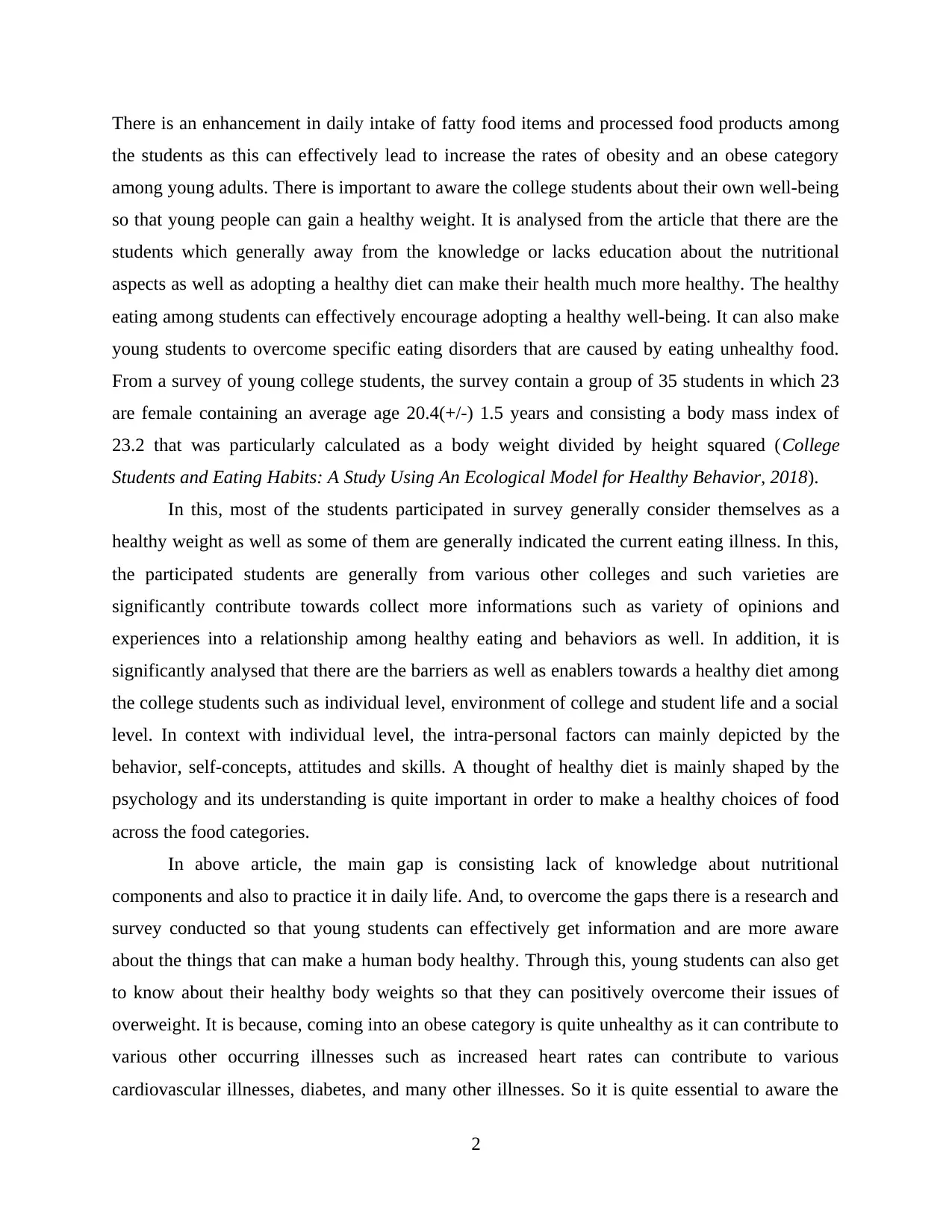
There is an enhancement in daily intake of fatty food items and processed food products among
the students as this can effectively lead to increase the rates of obesity and an obese category
among young adults. There is important to aware the college students about their own well-being
so that young people can gain a healthy weight. It is analysed from the article that there are the
students which generally away from the knowledge or lacks education about the nutritional
aspects as well as adopting a healthy diet can make their health much more healthy. The healthy
eating among students can effectively encourage adopting a healthy well-being. It can also make
young students to overcome specific eating disorders that are caused by eating unhealthy food.
From a survey of young college students, the survey contain a group of 35 students in which 23
are female containing an average age 20.4(+/-) 1.5 years and consisting a body mass index of
23.2 that was particularly calculated as a body weight divided by height squared (College
Students and Eating Habits: A Study Using An Ecological Model for Healthy Behavior, 2018).
In this, most of the students participated in survey generally consider themselves as a
healthy weight as well as some of them are generally indicated the current eating illness. In this,
the participated students are generally from various other colleges and such varieties are
significantly contribute towards collect more informations such as variety of opinions and
experiences into a relationship among healthy eating and behaviors as well. In addition, it is
significantly analysed that there are the barriers as well as enablers towards a healthy diet among
the college students such as individual level, environment of college and student life and a social
level. In context with individual level, the intra-personal factors can mainly depicted by the
behavior, self-concepts, attitudes and skills. A thought of healthy diet is mainly shaped by the
psychology and its understanding is quite important in order to make a healthy choices of food
across the food categories.
In above article, the main gap is consisting lack of knowledge about nutritional
components and also to practice it in daily life. And, to overcome the gaps there is a research and
survey conducted so that young students can effectively get information and are more aware
about the things that can make a human body healthy. Through this, young students can also get
to know about their healthy body weights so that they can positively overcome their issues of
overweight. It is because, coming into an obese category is quite unhealthy as it can contribute to
various other occurring illnesses such as increased heart rates can contribute to various
cardiovascular illnesses, diabetes, and many other illnesses. So it is quite essential to aware the
2
the students as this can effectively lead to increase the rates of obesity and an obese category
among young adults. There is important to aware the college students about their own well-being
so that young people can gain a healthy weight. It is analysed from the article that there are the
students which generally away from the knowledge or lacks education about the nutritional
aspects as well as adopting a healthy diet can make their health much more healthy. The healthy
eating among students can effectively encourage adopting a healthy well-being. It can also make
young students to overcome specific eating disorders that are caused by eating unhealthy food.
From a survey of young college students, the survey contain a group of 35 students in which 23
are female containing an average age 20.4(+/-) 1.5 years and consisting a body mass index of
23.2 that was particularly calculated as a body weight divided by height squared (College
Students and Eating Habits: A Study Using An Ecological Model for Healthy Behavior, 2018).
In this, most of the students participated in survey generally consider themselves as a
healthy weight as well as some of them are generally indicated the current eating illness. In this,
the participated students are generally from various other colleges and such varieties are
significantly contribute towards collect more informations such as variety of opinions and
experiences into a relationship among healthy eating and behaviors as well. In addition, it is
significantly analysed that there are the barriers as well as enablers towards a healthy diet among
the college students such as individual level, environment of college and student life and a social
level. In context with individual level, the intra-personal factors can mainly depicted by the
behavior, self-concepts, attitudes and skills. A thought of healthy diet is mainly shaped by the
psychology and its understanding is quite important in order to make a healthy choices of food
across the food categories.
In above article, the main gap is consisting lack of knowledge about nutritional
components and also to practice it in daily life. And, to overcome the gaps there is a research and
survey conducted so that young students can effectively get information and are more aware
about the things that can make a human body healthy. Through this, young students can also get
to know about their healthy body weights so that they can positively overcome their issues of
overweight. It is because, coming into an obese category is quite unhealthy as it can contribute to
various other occurring illnesses such as increased heart rates can contribute to various
cardiovascular illnesses, diabetes, and many other illnesses. So it is quite essential to aware the
2
Secure Best Marks with AI Grader
Need help grading? Try our AI Grader for instant feedback on your assignments.
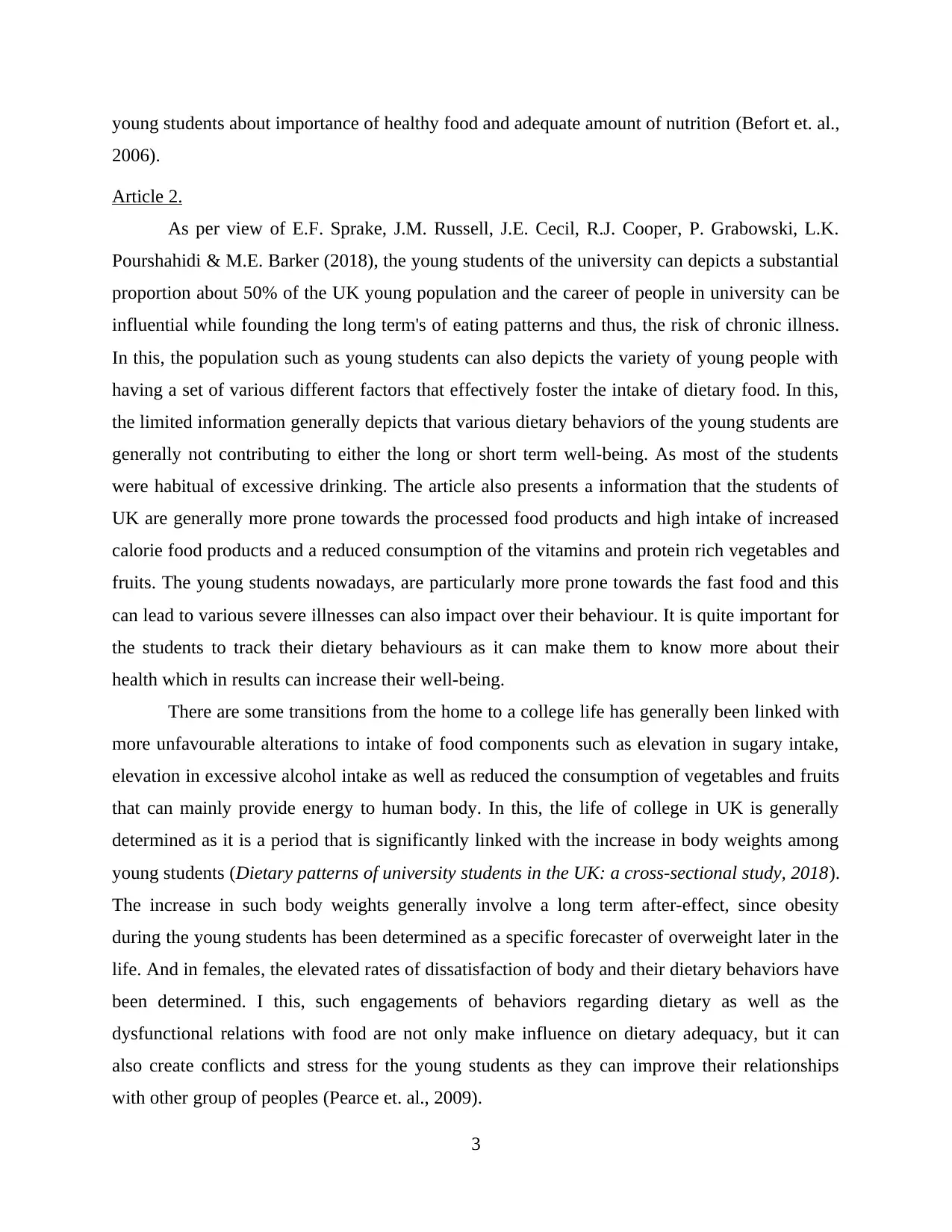
young students about importance of healthy food and adequate amount of nutrition (Befort et. al.,
2006).
Article 2.
As per view of E.F. Sprake, J.M. Russell, J.E. Cecil, R.J. Cooper, P. Grabowski, L.K.
Pourshahidi & M.E. Barker (2018), the young students of the university can depicts a substantial
proportion about 50% of the UK young population and the career of people in university can be
influential while founding the long term's of eating patterns and thus, the risk of chronic illness.
In this, the population such as young students can also depicts the variety of young people with
having a set of various different factors that effectively foster the intake of dietary food. In this,
the limited information generally depicts that various dietary behaviors of the young students are
generally not contributing to either the long or short term well-being. As most of the students
were habitual of excessive drinking. The article also presents a information that the students of
UK are generally more prone towards the processed food products and high intake of increased
calorie food products and a reduced consumption of the vitamins and protein rich vegetables and
fruits. The young students nowadays, are particularly more prone towards the fast food and this
can lead to various severe illnesses can also impact over their behaviour. It is quite important for
the students to track their dietary behaviours as it can make them to know more about their
health which in results can increase their well-being.
There are some transitions from the home to a college life has generally been linked with
more unfavourable alterations to intake of food components such as elevation in sugary intake,
elevation in excessive alcohol intake as well as reduced the consumption of vegetables and fruits
that can mainly provide energy to human body. In this, the life of college in UK is generally
determined as it is a period that is significantly linked with the increase in body weights among
young students (Dietary patterns of university students in the UK: a cross-sectional study, 2018).
The increase in such body weights generally involve a long term after-effect, since obesity
during the young students has been determined as a specific forecaster of overweight later in the
life. And in females, the elevated rates of dissatisfaction of body and their dietary behaviors have
been determined. I this, such engagements of behaviors regarding dietary as well as the
dysfunctional relations with food are not only make influence on dietary adequacy, but it can
also create conflicts and stress for the young students as they can improve their relationships
with other group of peoples (Pearce et. al., 2009).
3
2006).
Article 2.
As per view of E.F. Sprake, J.M. Russell, J.E. Cecil, R.J. Cooper, P. Grabowski, L.K.
Pourshahidi & M.E. Barker (2018), the young students of the university can depicts a substantial
proportion about 50% of the UK young population and the career of people in university can be
influential while founding the long term's of eating patterns and thus, the risk of chronic illness.
In this, the population such as young students can also depicts the variety of young people with
having a set of various different factors that effectively foster the intake of dietary food. In this,
the limited information generally depicts that various dietary behaviors of the young students are
generally not contributing to either the long or short term well-being. As most of the students
were habitual of excessive drinking. The article also presents a information that the students of
UK are generally more prone towards the processed food products and high intake of increased
calorie food products and a reduced consumption of the vitamins and protein rich vegetables and
fruits. The young students nowadays, are particularly more prone towards the fast food and this
can lead to various severe illnesses can also impact over their behaviour. It is quite important for
the students to track their dietary behaviours as it can make them to know more about their
health which in results can increase their well-being.
There are some transitions from the home to a college life has generally been linked with
more unfavourable alterations to intake of food components such as elevation in sugary intake,
elevation in excessive alcohol intake as well as reduced the consumption of vegetables and fruits
that can mainly provide energy to human body. In this, the life of college in UK is generally
determined as it is a period that is significantly linked with the increase in body weights among
young students (Dietary patterns of university students in the UK: a cross-sectional study, 2018).
The increase in such body weights generally involve a long term after-effect, since obesity
during the young students has been determined as a specific forecaster of overweight later in the
life. And in females, the elevated rates of dissatisfaction of body and their dietary behaviors have
been determined. I this, such engagements of behaviors regarding dietary as well as the
dysfunctional relations with food are not only make influence on dietary adequacy, but it can
also create conflicts and stress for the young students as they can improve their relationships
with other group of peoples (Pearce et. al., 2009).
3
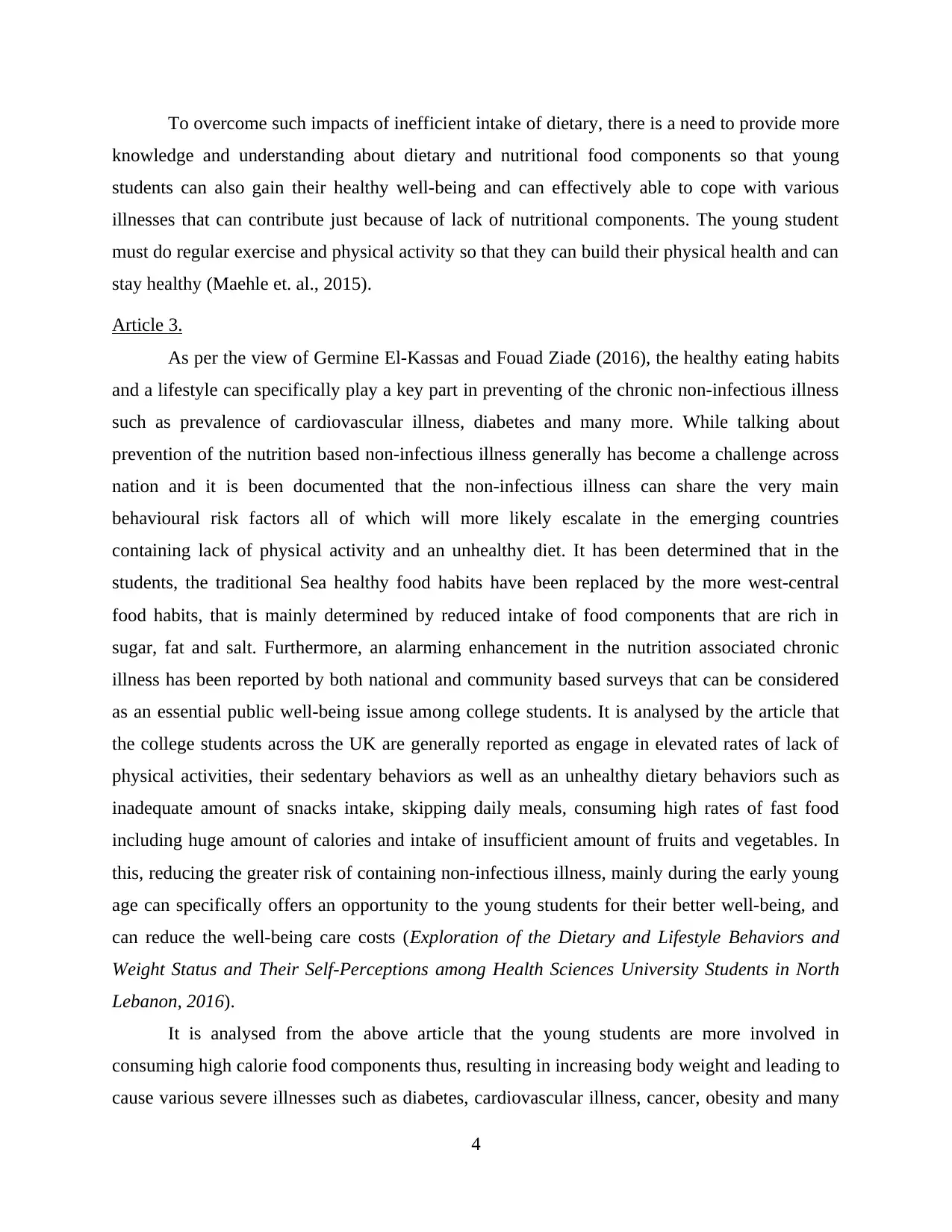
To overcome such impacts of inefficient intake of dietary, there is a need to provide more
knowledge and understanding about dietary and nutritional food components so that young
students can also gain their healthy well-being and can effectively able to cope with various
illnesses that can contribute just because of lack of nutritional components. The young student
must do regular exercise and physical activity so that they can build their physical health and can
stay healthy (Maehle et. al., 2015).
Article 3.
As per the view of Germine El-Kassas and Fouad Ziade (2016), the healthy eating habits
and a lifestyle can specifically play a key part in preventing of the chronic non-infectious illness
such as prevalence of cardiovascular illness, diabetes and many more. While talking about
prevention of the nutrition based non-infectious illness generally has become a challenge across
nation and it is been documented that the non-infectious illness can share the very main
behavioural risk factors all of which will more likely escalate in the emerging countries
containing lack of physical activity and an unhealthy diet. It has been determined that in the
students, the traditional Sea healthy food habits have been replaced by the more west-central
food habits, that is mainly determined by reduced intake of food components that are rich in
sugar, fat and salt. Furthermore, an alarming enhancement in the nutrition associated chronic
illness has been reported by both national and community based surveys that can be considered
as an essential public well-being issue among college students. It is analysed by the article that
the college students across the UK are generally reported as engage in elevated rates of lack of
physical activities, their sedentary behaviors as well as an unhealthy dietary behaviors such as
inadequate amount of snacks intake, skipping daily meals, consuming high rates of fast food
including huge amount of calories and intake of insufficient amount of fruits and vegetables. In
this, reducing the greater risk of containing non-infectious illness, mainly during the early young
age can specifically offers an opportunity to the young students for their better well-being, and
can reduce the well-being care costs (Exploration of the Dietary and Lifestyle Behaviors and
Weight Status and Their Self-Perceptions among Health Sciences University Students in North
Lebanon, 2016).
It is analysed from the above article that the young students are more involved in
consuming high calorie food components thus, resulting in increasing body weight and leading to
cause various severe illnesses such as diabetes, cardiovascular illness, cancer, obesity and many
4
knowledge and understanding about dietary and nutritional food components so that young
students can also gain their healthy well-being and can effectively able to cope with various
illnesses that can contribute just because of lack of nutritional components. The young student
must do regular exercise and physical activity so that they can build their physical health and can
stay healthy (Maehle et. al., 2015).
Article 3.
As per the view of Germine El-Kassas and Fouad Ziade (2016), the healthy eating habits
and a lifestyle can specifically play a key part in preventing of the chronic non-infectious illness
such as prevalence of cardiovascular illness, diabetes and many more. While talking about
prevention of the nutrition based non-infectious illness generally has become a challenge across
nation and it is been documented that the non-infectious illness can share the very main
behavioural risk factors all of which will more likely escalate in the emerging countries
containing lack of physical activity and an unhealthy diet. It has been determined that in the
students, the traditional Sea healthy food habits have been replaced by the more west-central
food habits, that is mainly determined by reduced intake of food components that are rich in
sugar, fat and salt. Furthermore, an alarming enhancement in the nutrition associated chronic
illness has been reported by both national and community based surveys that can be considered
as an essential public well-being issue among college students. It is analysed by the article that
the college students across the UK are generally reported as engage in elevated rates of lack of
physical activities, their sedentary behaviors as well as an unhealthy dietary behaviors such as
inadequate amount of snacks intake, skipping daily meals, consuming high rates of fast food
including huge amount of calories and intake of insufficient amount of fruits and vegetables. In
this, reducing the greater risk of containing non-infectious illness, mainly during the early young
age can specifically offers an opportunity to the young students for their better well-being, and
can reduce the well-being care costs (Exploration of the Dietary and Lifestyle Behaviors and
Weight Status and Their Self-Perceptions among Health Sciences University Students in North
Lebanon, 2016).
It is analysed from the above article that the young students are more involved in
consuming high calorie food components thus, resulting in increasing body weight and leading to
cause various severe illnesses such as diabetes, cardiovascular illness, cancer, obesity and many
4
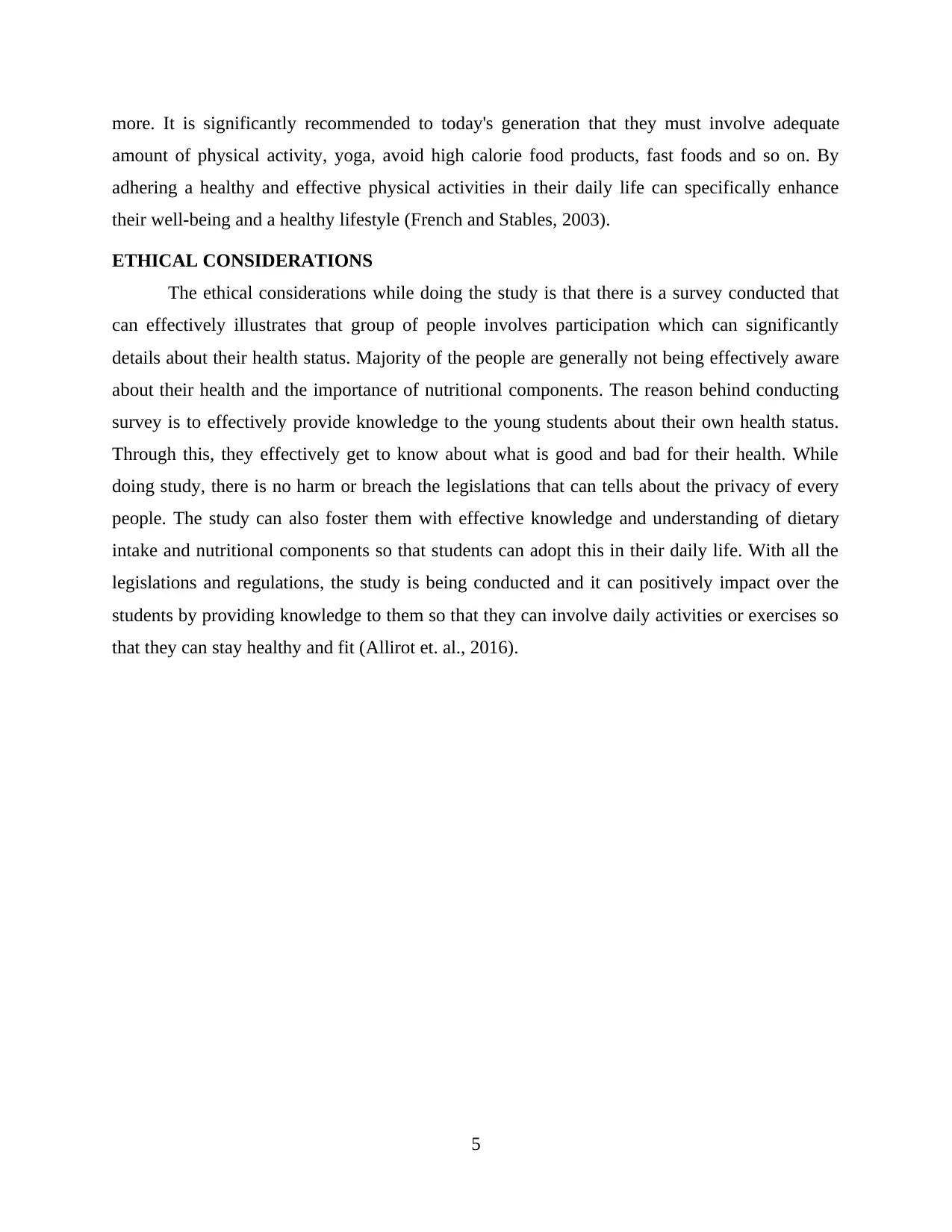
more. It is significantly recommended to today's generation that they must involve adequate
amount of physical activity, yoga, avoid high calorie food products, fast foods and so on. By
adhering a healthy and effective physical activities in their daily life can specifically enhance
their well-being and a healthy lifestyle (French and Stables, 2003).
ETHICAL CONSIDERATIONS
The ethical considerations while doing the study is that there is a survey conducted that
can effectively illustrates that group of people involves participation which can significantly
details about their health status. Majority of the people are generally not being effectively aware
about their health and the importance of nutritional components. The reason behind conducting
survey is to effectively provide knowledge to the young students about their own health status.
Through this, they effectively get to know about what is good and bad for their health. While
doing study, there is no harm or breach the legislations that can tells about the privacy of every
people. The study can also foster them with effective knowledge and understanding of dietary
intake and nutritional components so that students can adopt this in their daily life. With all the
legislations and regulations, the study is being conducted and it can positively impact over the
students by providing knowledge to them so that they can involve daily activities or exercises so
that they can stay healthy and fit (Allirot et. al., 2016).
5
amount of physical activity, yoga, avoid high calorie food products, fast foods and so on. By
adhering a healthy and effective physical activities in their daily life can specifically enhance
their well-being and a healthy lifestyle (French and Stables, 2003).
ETHICAL CONSIDERATIONS
The ethical considerations while doing the study is that there is a survey conducted that
can effectively illustrates that group of people involves participation which can significantly
details about their health status. Majority of the people are generally not being effectively aware
about their health and the importance of nutritional components. The reason behind conducting
survey is to effectively provide knowledge to the young students about their own health status.
Through this, they effectively get to know about what is good and bad for their health. While
doing study, there is no harm or breach the legislations that can tells about the privacy of every
people. The study can also foster them with effective knowledge and understanding of dietary
intake and nutritional components so that students can adopt this in their daily life. With all the
legislations and regulations, the study is being conducted and it can positively impact over the
students by providing knowledge to them so that they can involve daily activities or exercises so
that they can stay healthy and fit (Allirot et. al., 2016).
5
Paraphrase This Document
Need a fresh take? Get an instant paraphrase of this document with our AI Paraphraser
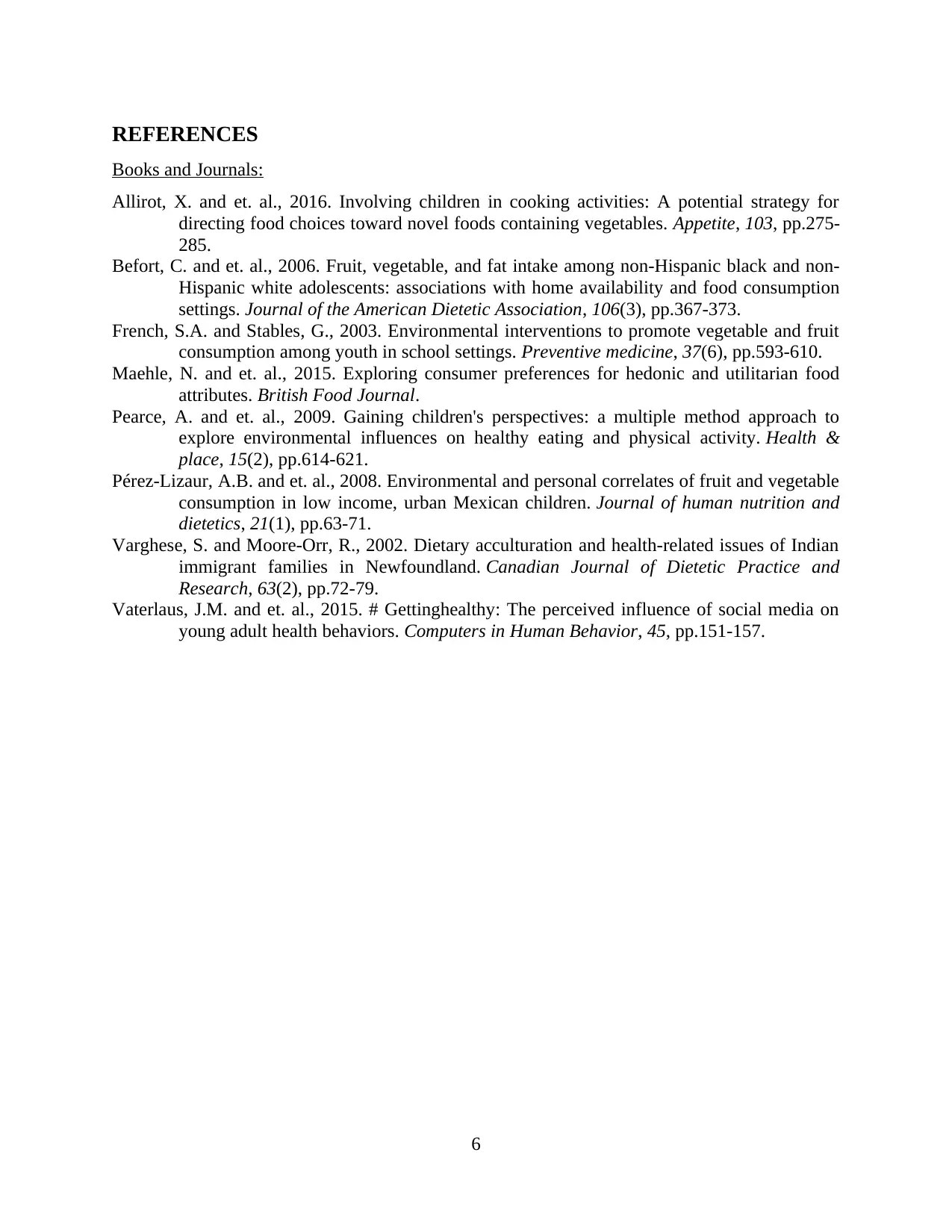
REFERENCES
Books and Journals:
Allirot, X. and et. al., 2016. Involving children in cooking activities: A potential strategy for
directing food choices toward novel foods containing vegetables. Appetite, 103, pp.275-
285.
Befort, C. and et. al., 2006. Fruit, vegetable, and fat intake among non-Hispanic black and non-
Hispanic white adolescents: associations with home availability and food consumption
settings. Journal of the American Dietetic Association, 106(3), pp.367-373.
French, S.A. and Stables, G., 2003. Environmental interventions to promote vegetable and fruit
consumption among youth in school settings. Preventive medicine, 37(6), pp.593-610.
Maehle, N. and et. al., 2015. Exploring consumer preferences for hedonic and utilitarian food
attributes. British Food Journal.
Pearce, A. and et. al., 2009. Gaining children's perspectives: a multiple method approach to
explore environmental influences on healthy eating and physical activity. Health &
place, 15(2), pp.614-621.
Pérez‐Lizaur, A.B. and et. al., 2008. Environmental and personal correlates of fruit and vegetable
consumption in low income, urban Mexican children. Journal of human nutrition and
dietetics, 21(1), pp.63-71.
Varghese, S. and Moore-Orr, R., 2002. Dietary acculturation and health-related issues of Indian
immigrant families in Newfoundland. Canadian Journal of Dietetic Practice and
Research, 63(2), pp.72-79.
Vaterlaus, J.M. and et. al., 2015. # Gettinghealthy: The perceived influence of social media on
young adult health behaviors. Computers in Human Behavior, 45, pp.151-157.
6
Books and Journals:
Allirot, X. and et. al., 2016. Involving children in cooking activities: A potential strategy for
directing food choices toward novel foods containing vegetables. Appetite, 103, pp.275-
285.
Befort, C. and et. al., 2006. Fruit, vegetable, and fat intake among non-Hispanic black and non-
Hispanic white adolescents: associations with home availability and food consumption
settings. Journal of the American Dietetic Association, 106(3), pp.367-373.
French, S.A. and Stables, G., 2003. Environmental interventions to promote vegetable and fruit
consumption among youth in school settings. Preventive medicine, 37(6), pp.593-610.
Maehle, N. and et. al., 2015. Exploring consumer preferences for hedonic and utilitarian food
attributes. British Food Journal.
Pearce, A. and et. al., 2009. Gaining children's perspectives: a multiple method approach to
explore environmental influences on healthy eating and physical activity. Health &
place, 15(2), pp.614-621.
Pérez‐Lizaur, A.B. and et. al., 2008. Environmental and personal correlates of fruit and vegetable
consumption in low income, urban Mexican children. Journal of human nutrition and
dietetics, 21(1), pp.63-71.
Varghese, S. and Moore-Orr, R., 2002. Dietary acculturation and health-related issues of Indian
immigrant families in Newfoundland. Canadian Journal of Dietetic Practice and
Research, 63(2), pp.72-79.
Vaterlaus, J.M. and et. al., 2015. # Gettinghealthy: The perceived influence of social media on
young adult health behaviors. Computers in Human Behavior, 45, pp.151-157.
6
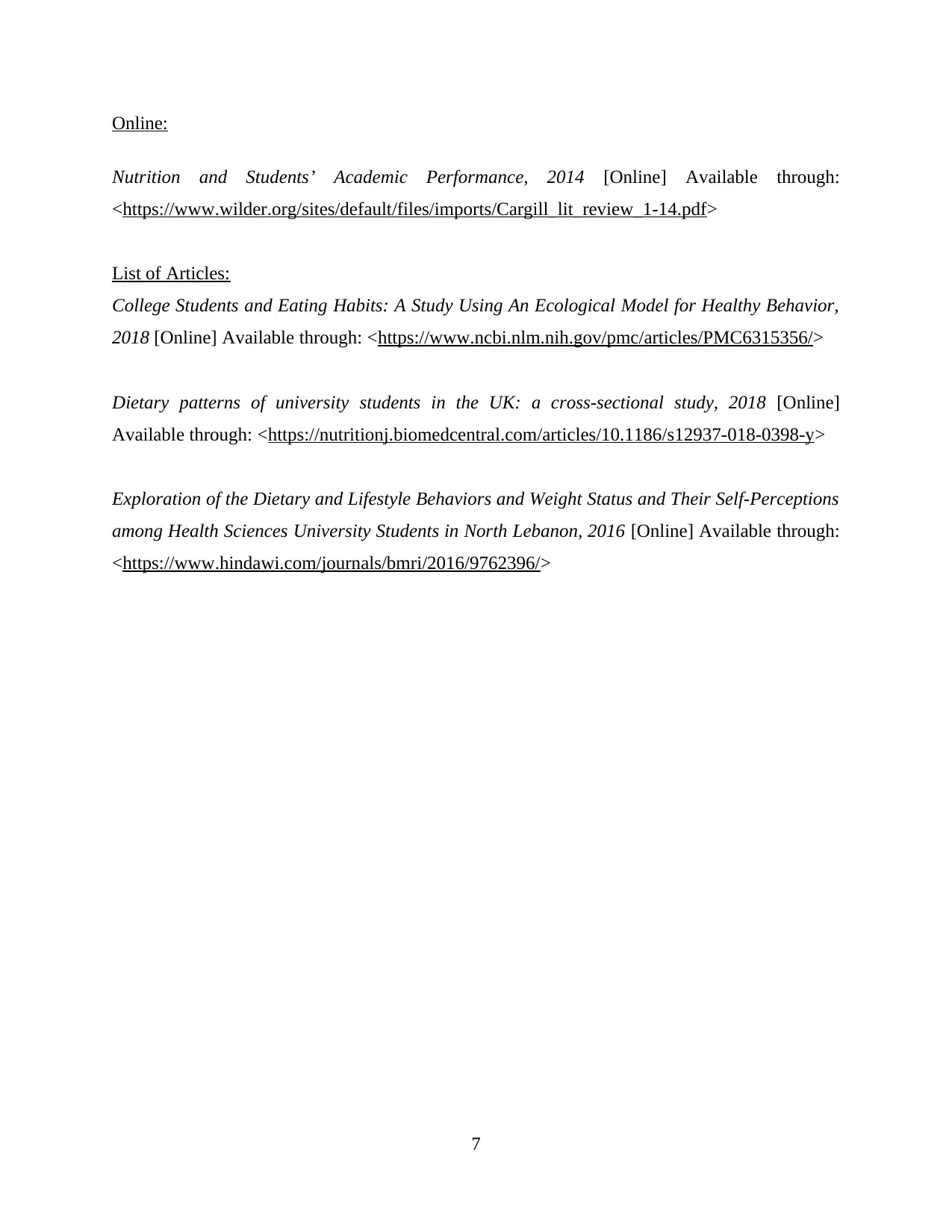
Online:
Nutrition and Students’ Academic Performance, 2014 [Online] Available through:
<https://www.wilder.org/sites/default/files/imports/Cargill_lit_review_1-14.pdf>
List of Articles:
College Students and Eating Habits: A Study Using An Ecological Model for Healthy Behavior,
2018 [Online] Available through: <https://www.ncbi.nlm.nih.gov/pmc/articles/PMC6315356/>
Dietary patterns of university students in the UK: a cross-sectional study, 2018 [Online]
Available through: <https://nutritionj.biomedcentral.com/articles/10.1186/s12937-018-0398-y>
Exploration of the Dietary and Lifestyle Behaviors and Weight Status and Their Self-Perceptions
among Health Sciences University Students in North Lebanon, 2016 [Online] Available through:
<https://www.hindawi.com/journals/bmri/2016/9762396/>
7
Nutrition and Students’ Academic Performance, 2014 [Online] Available through:
<https://www.wilder.org/sites/default/files/imports/Cargill_lit_review_1-14.pdf>
List of Articles:
College Students and Eating Habits: A Study Using An Ecological Model for Healthy Behavior,
2018 [Online] Available through: <https://www.ncbi.nlm.nih.gov/pmc/articles/PMC6315356/>
Dietary patterns of university students in the UK: a cross-sectional study, 2018 [Online]
Available through: <https://nutritionj.biomedcentral.com/articles/10.1186/s12937-018-0398-y>
Exploration of the Dietary and Lifestyle Behaviors and Weight Status and Their Self-Perceptions
among Health Sciences University Students in North Lebanon, 2016 [Online] Available through:
<https://www.hindawi.com/journals/bmri/2016/9762396/>
7
1 out of 9
Related Documents
Your All-in-One AI-Powered Toolkit for Academic Success.
+13062052269
info@desklib.com
Available 24*7 on WhatsApp / Email
![[object Object]](/_next/static/media/star-bottom.7253800d.svg)
Unlock your academic potential
© 2024 | Zucol Services PVT LTD | All rights reserved.





